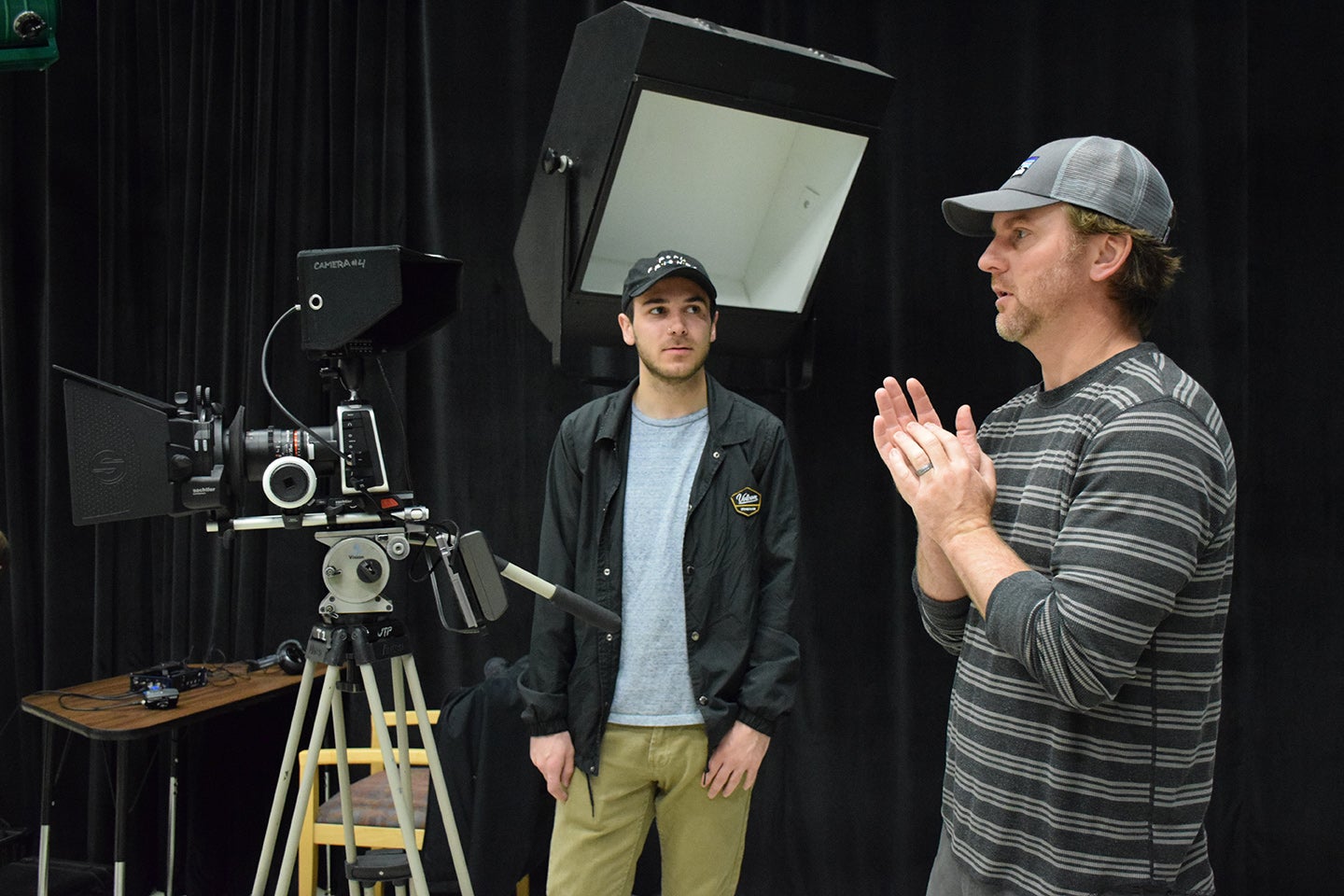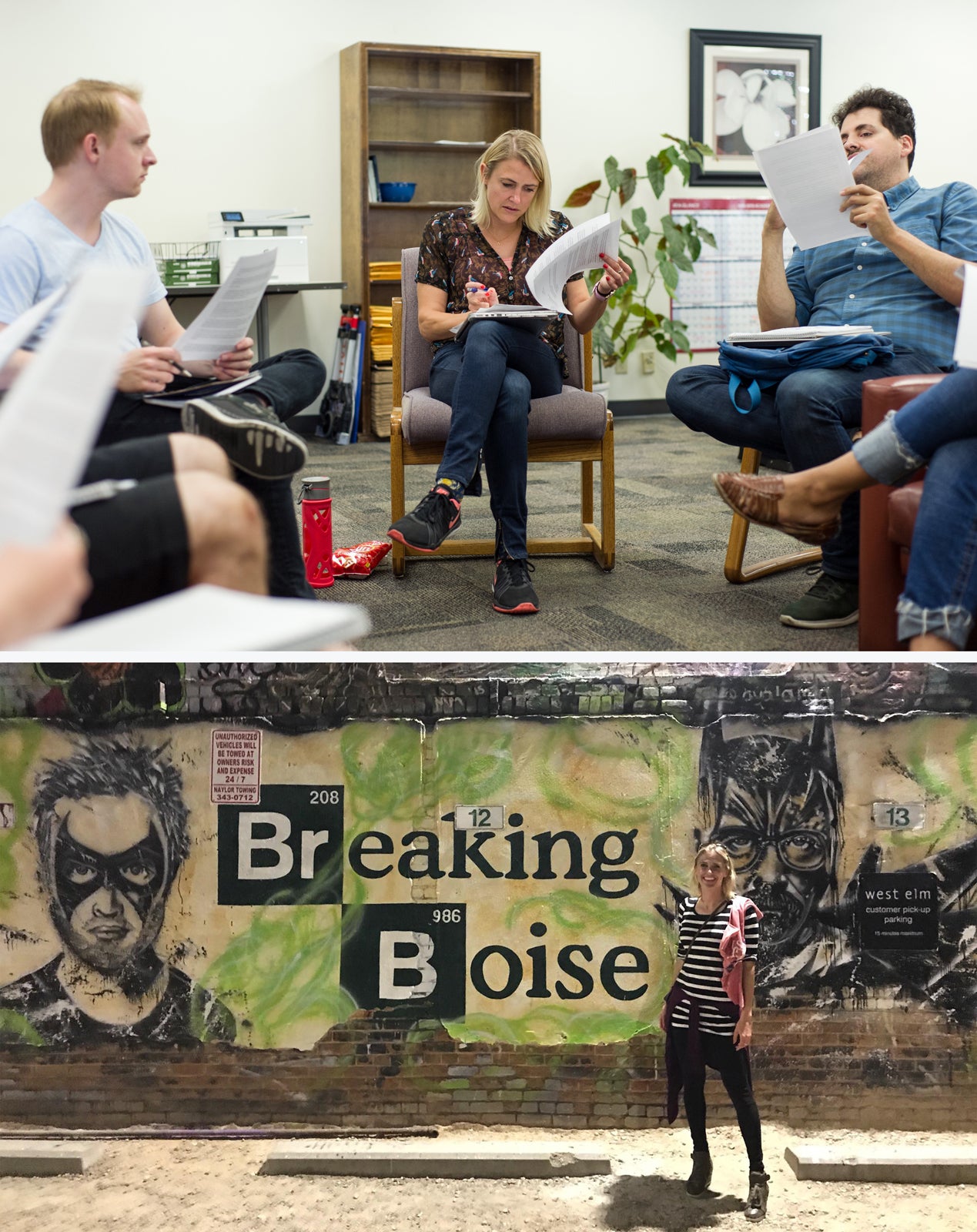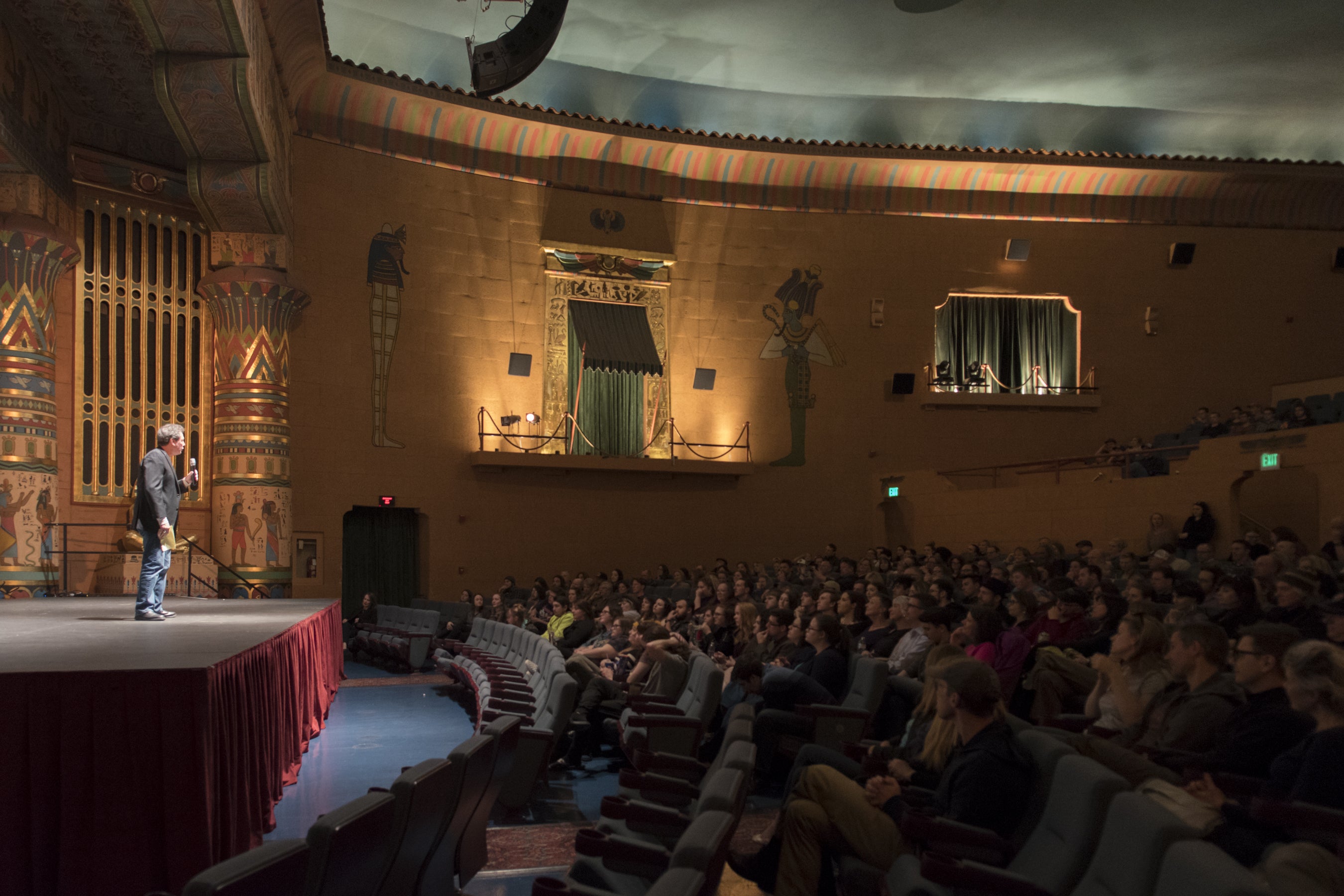
Most of us give little thought to what it takes to produce a TV series. We tune in weekly or binge-watch stories of scandal, love affairs, murders and betrayals. We stream our favorite shows while on vacation. We mark the start of new seasons on our calendars without knowing about the months of working and reworking that go into writing a basic script, let alone casting and filming it.
Seeing opportunity in this golden age of television, Boise State launched its Narrative TV Initiative (NTVI) in the fall 2016. The multi-disciplinary program is designed to train students to work in a highly regimented industry ravenous for storytellers — the writers, production crews, artists and musicians who bring the shows to life.
Over four semesters, students from a variety of disciplines write and produce three episodes of a TV series, learning skills to carry them into a variety of careers including screenwriting, filmmaking, theater, video production, graphic novel production, politics, law, business and other fields.
The NTVI is part of new film and narrative arts degrees offered within the recently created School of the Arts (for more on the school, see page 8).
Students may enroll in all four NTVI semesters, or just one, depending on their interests. They learn from professors in theater, film and creative writing, as well as industry professionals.

to campus and poses in front of a mural in Boise.
Photos by Allison Corona and NTVI
Heather Marion, a writer on the television series “Better Call Saul,” has been a visiting guest lecturer three times since the program began. She initially came to campus thanks to an invitation from Boise State’s Public Culture Initiative. She offered guidance in creating the writers’ room semester, which is the first of the four semesters and where writers collaborate to write a script. Professional cinematographer Lincoln Lewis also mentored students in the program, which includes semesters in pre-production, production and post-production.
The NTVI was the brainchild of Boise State film professor Ryan Cannon, who fashioned it after a similar program at the University of Texas’s Michener Center for Writers, where he received a Master of Fine Arts in Writing.
He worked with Boise State students who, last March, premiered their first series “And Beyond” at the Egyptian Theatre. Nolan Turner, a graduate student from Boise State’s acclaimed MFA in Creative Writing program, along with several other graduate and undergraduate students, collaborated on the script.

Each new semester, faculty are applying lessons learned in the classroom and on set to get even closer to the industry experience. For example, in order to hit the ground running with scripts to develop, they held a contest for the writers’ room semester and students applied with ideas and writing samples | Photo by Patrick Sweeney
“Film touches on so many of the arts, from designers, actors, technicians to artists,” Cannon said. “We want artists to be designing sets, business students doing marketing. The first time around it was mostly creative writing and theater production students, but we want to see it open up.”
As an example, it’s possible world languages students could get involved with translations and dubbing.
In a recent article, Vanity Fair estimated that close to 500 series aired on network, cable and streaming outlets last year. Netflix alone had 700 original series and movies in the works during 2018, the article stated.
Associate Professor of Fiction Brady Udall, a novelist and screenwriter who teaches the writers’ room semester of NTVI, said TV has overtaken movies.
“It’s almost like Hollywood filmmaking is dying,” Udall said. “Everyone wants to make a blockbuster, but true artistic innovation is happening in TV now.”
Udall believes Boise State’s program is ahead of the curve in training students for jobs in the industry.
“As far as I know, this is only being done in one or two other places in the country,” he said.
And where once TV jobs were only available in Los Angeles or New York, now work is available in cities such as Salt Lake City, Portland, Seattle, Austin, Albuquerque and San Francisco. A film crew is usually 50 to 100 people and it takes about three to four months to produce a season.
The stability of employment in series TV is better than movies, Cannon said, since the same crew may work on each season. Boise State students involved in the first four semesters of NTVI have emerged with solid, employable skills and great portfolios.
“Seeing a production from beginning to end has really empowered them to know all the pieces now,” he said.
Students also have learned leadership, collaboration and organizational skills that teach them how to find creative solutions to difficult problems. Those skills are valuable in any career.
“I’m always struck by where they start and where they’ve ended up,” Cannon said.
For example, student Tyler Maynard (‘18, BA, communication) began as first assistant camera on “And Beyond,” but after being mentored by Lewis in cinematography, Maynard was bumped up to director of photography. Ashley Abel (‘18, BA, communication) became first assistant director and her skills were such that Cannon said she could have worked on some of the professional film sets he’s been on.
Ben Wieland, who graduated spring 2018 with a degree in English with a creative writing emphasis, went through all four NTVI semesters. Though his script wasn’t produced, he parlayed his audio and engineering skills learned as a musician into the production semesters. He worked on the audio crew, operated a boom, did sound mixing and edited a few scenes in the first episode of “And Beyond.”
“I learned a ton about production and what it takes to see a production through to the end,” Wieland said.
Networking with students and professionals has been the most valuable part of the experience, he said. A local professional sound technician heard about Wieland through Lewis, which led to work on a commercial for the Idaho Potato Commission. He’s also working on a short film with a few of the students from “And Beyond.”
“NTVI was the most valuable aspect of my undergraduate degree,” he said. “It’s opened doors for all of us.”
— Ben Wieland
Each new semester, faculty are applying lessons learned in the classroom and on set to get even closer to the industry experience. For example, in order to hit the ground running with scripts to develop, they held a contest for the writers’ room semester and students applied with ideas and writing samples.
“Last time, it took weeks to come up with a good idea,” Udall said. “This time we have several good ideas to work on, then Ryan Cannon, Rulon Wood and I will decide what will get produced.”
“Ryan and I will act as studio executives and certain students will be showrunners who run the writers’ room,” he added. “Our students are getting some really great experience at quite a young age.”